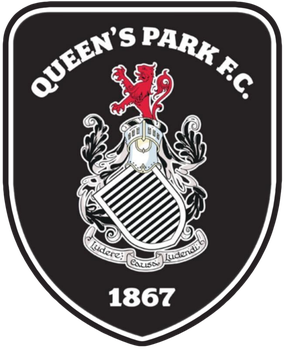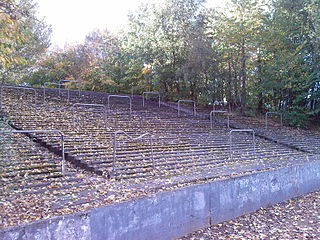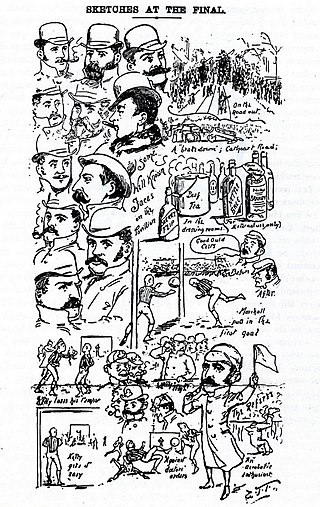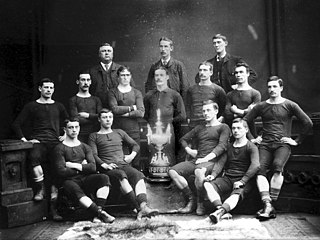Related Research Articles

Queen's Park Football Club is a Scottish professional football club based in Glasgow, which currently plays in the Scottish Championship, the second tier of the Scottish football pyramid. Queen's Park is the oldest association football club in Scotland, having been founded in 1867, and is the 10th oldest in the world.

Third Lanark Athletic Club was a Scottish football club based in Glasgow. Founded in 1872 as an offshoot of the 3rd Lanarkshire Rifle Volunteers, the club was a founder member of the Scottish Football Association (SFA) in 1872 and the Scottish Football League (SFL) in 1890. Third Lanark played in the top division of the SFL for the majority of the club's existence, and won the league championship in 1903–04. The club also won the Scottish Cup twice, in 1889 and 1905. Third Lanark went out of business in 1967, as a result of mismanagement, six years after having finished in third place in the SFL. Third Lanark's former ground, Cathkin Park in Crosshill, is still partially standing and is used for minor league football.

Cathkin Park is a municipal park in Glasgow, Scotland. The park is maintained by the city's parks department, and it is a public place where football is still played. The park contains the site of the second Hampden Park, previously home to the football clubs Queen's Park and Third Lanark. The site of the original Hampden Park is just to the west.

John McPherson was a Scottish footballer who played for Cowlairs, Kilmarnock, Rangers and the Scotland national team.
Robert Evans was a Scottish football player and manager, most notable for his time with Celtic.

Hampden Park in Glasgow is the primary home stadium for the Scotland national football team. This has been the case since 1906, soon after it opened. The present site of Hampden Park is the third location to bear that name and both the previous locations also hosted Scotland games. Scotland have also played many of their home games in other stadiums throughout their history, both in friendly matches and for competitive tournaments.

Robert Francis Dudgeon Ancell was a Scottish football player and manager. He played as a left back for St Mirren, Newcastle United, Dundee and Aberdeen. He won two full caps with the Scotland national football team who he also represented in an unofficial war time match. He managed Berwick Rangers, Dunfermline Athletic, Motherwell and Dundee during the 1950s and 1960s.
The Glasgow Cup is a football tournament open to teams from Glasgow, Scotland. Operated by the Glasgow Football Association, it was competed for annually by senior Glasgow clubs from 1887 until 1989. It is now competed for between the senior teams of Clyde, Partick Thistle and Queen's Park and the youth teams of Celtic and Rangers, and has used both knockout and round robin formats to determine the finalists.
David Prophet McLean was a Scottish footballer who played as a striker, scoring consistently throughout his career. At club level he represented Celtic, Preston North End, Sheffield Wednesday, Third Lanark, Rangers, Bradford, Dundee and Forfar Athletic. He had one cap for Scotland.

The 1873–74 Scottish Cup – officially the Scottish Football Association Challenge Cup – was the first season of Scotland's most prestigious football knockout competition. A total of 16 teams from the west of Scotland entered the competition, however only 14 would play a match after two withdrawals. The competition began with the first match between Renton and Kilmarnock on 18 October 1873 and concluded with the final on 21 March 1874. After 16 matches and 38 goals, the inaugural cup was won by Queen's Park who defeated fellow Glasgow club Clydesdale 2–0 in the final.
The 1959 Scottish League Cup final was a football match played on 24 October 1959 at Hampden Park in Glasgow and was the final of the 14th Scottish League Cup competition. The final was contested by Hearts, who had won the previous year's final, and Third Lanark. Third Lanark led 1–0 at half time thanks to an early goal by Joe McInnes, but Hearts turned things around and won 2–1 to retain the cup thanks to second half goals by Johnny Hamilton and Alex Young. Hearts later completed a League and League Cup double – the only non Old Firm side to achieve such a double.

The 1889 Scottish Cup Final, colloquially known as the Snow final, was a football match played on 2 February 1889 at Hampden Park in Crosshill and was the final of the 16th staging of the Scottish Cup. Celtic and Third Lanark contested the match.
The 1959–60 Scottish League Cup was the fourteenth season of Scotland's second football knockout competition. The competition was won by Heart of Midlothian for a second successive season, after they defeated Third Lanark 2–1 in the final. Hearts would later go on to become the only Scottish club outside the Old Firm to win a League and League Cup double.

The Glasgow Merchants' Charity Cup was a knockout football tournament open to teams from in and around Glasgow and later on in the tournament's history, teams from outwith Glasgow. Invitations were made and sent out by the Glasgow Charity Cup Committee (GCCC) at their discretion, but no criteria were ever published.
Cathkin Park was a football ground in the Crosshill area of Glasgow, Scotland. It was the home ground of Third Lanark from their foundation in 1872 until they moved to New Cathkin Park in 1903. It also hosted Scottish Cup final matches and the Scotland national team.

William Loudon Wardrope was a Scottish footballer who played in the Football League for Middlesbrough and Newcastle United, mainly as an outside left.
George Hay was a Scottish footballer who played as a centre forward.
Battlefield Football Club, often referred to as The Battlefield, was a 19th-century football club based in Langside, in Glasgow. The club took its name from the site of the Battle of Langside in 1568.
References
- ↑ "Dave Hilley". Barry Hugman's Footballers. Retrieved 17 April 2017.
- 1 2 "Dave Hilley - Scotland Football League Record from 02 Sep 1959 to 02 Sep 1959 clubs - Third Lanark". www.londonhearts.com. Retrieved 18 May 2018.
- ↑ Ronnie McDevitt (2016). Scotland in the 60s: The Definitive Account of the Scottish National Football Side During the 1960s. Pitch Publishing. ISBN 9781785312458.
- ↑ Scotland U23 player Hilley, David, FitbaStats
- 1 2 3 Third Lanark brothers remember 'stuff of dreams' playing with legendary club in 1959 League Cup final, The Herald, 17 October 2019
- ↑ Third's Defence Strive Nobly But In Vain, The Glasgow Herald, 26 October 1959
- ↑ Third Lanark [documentary], BBC Alba, 27 January 2018